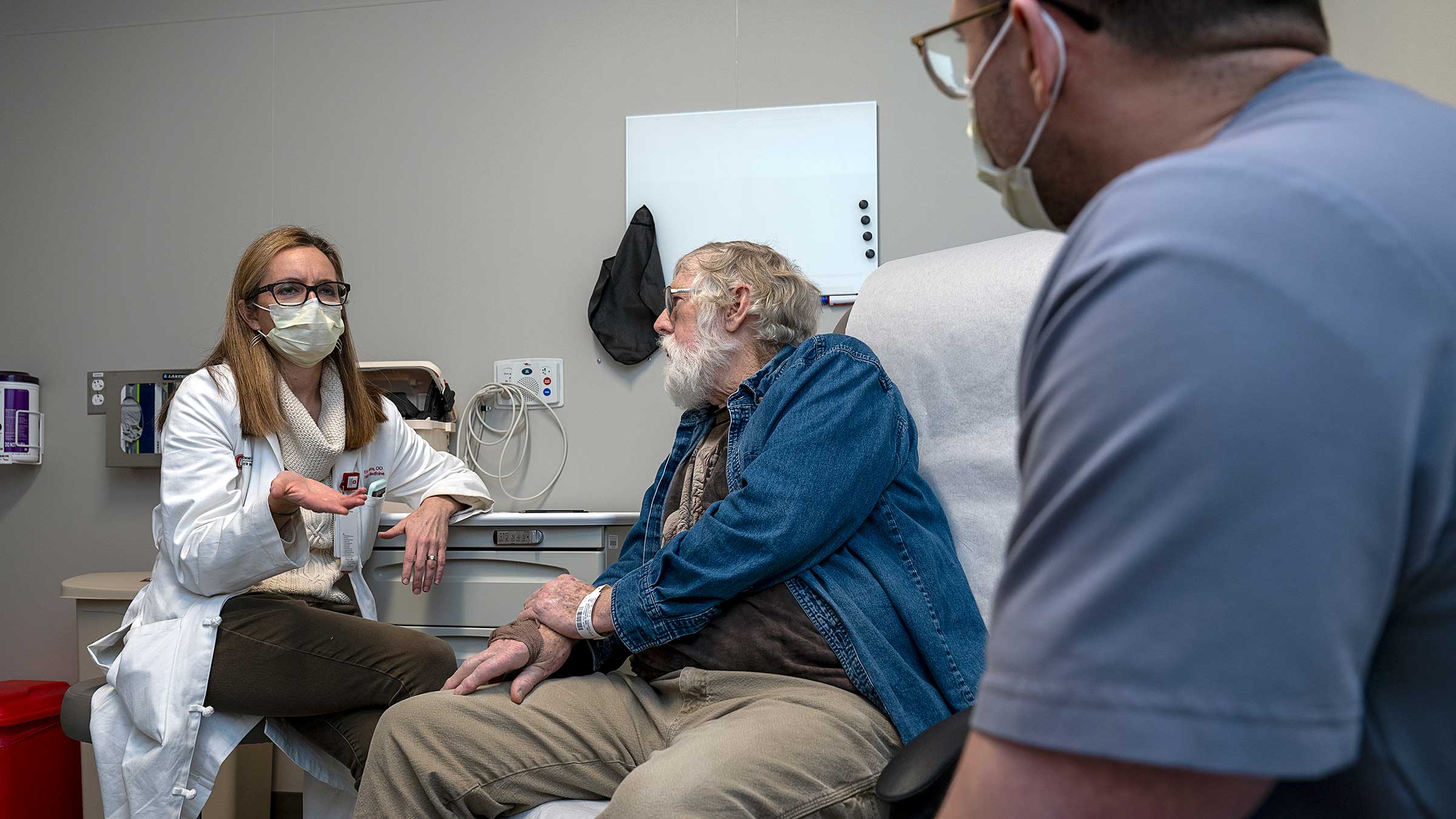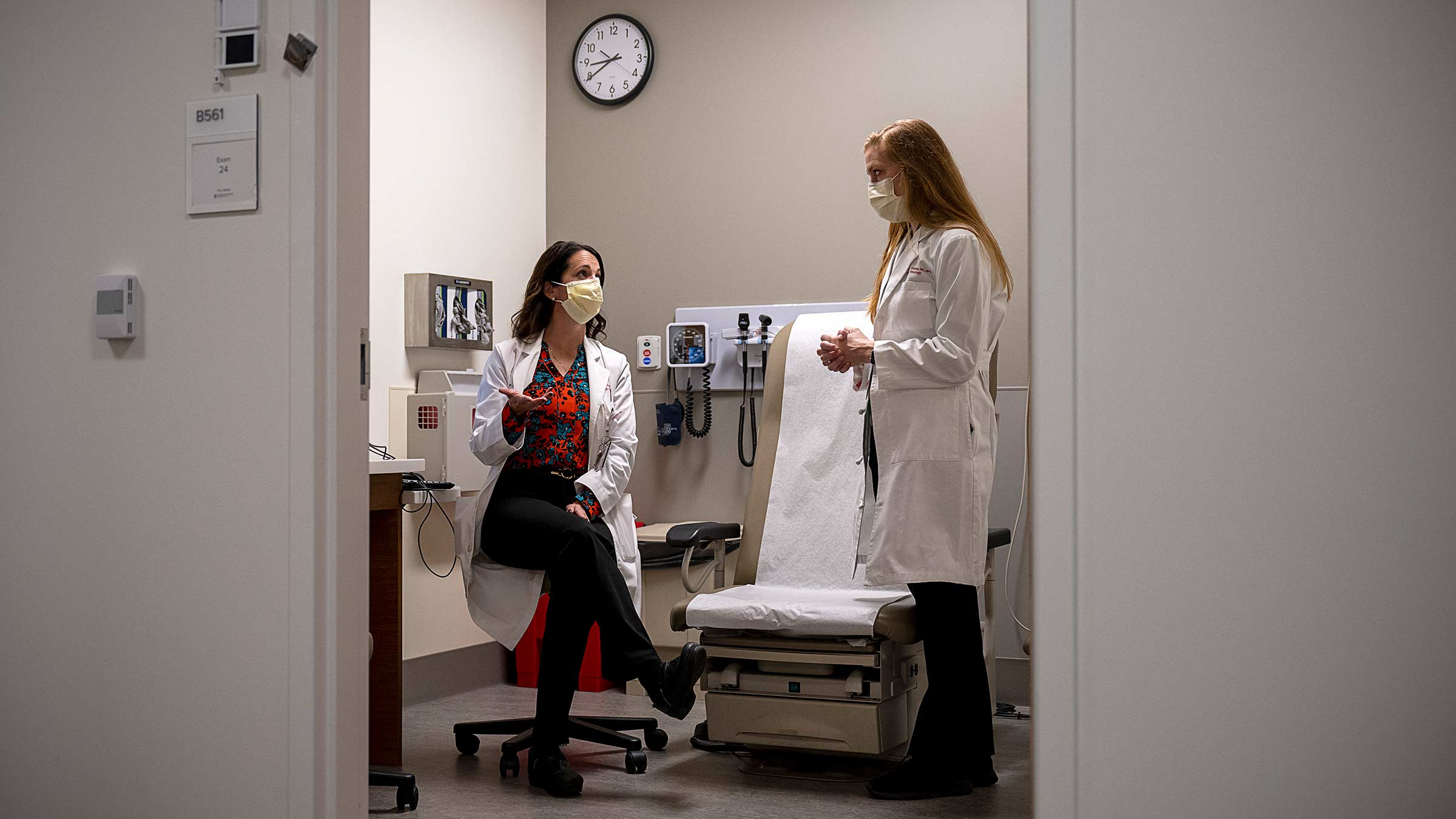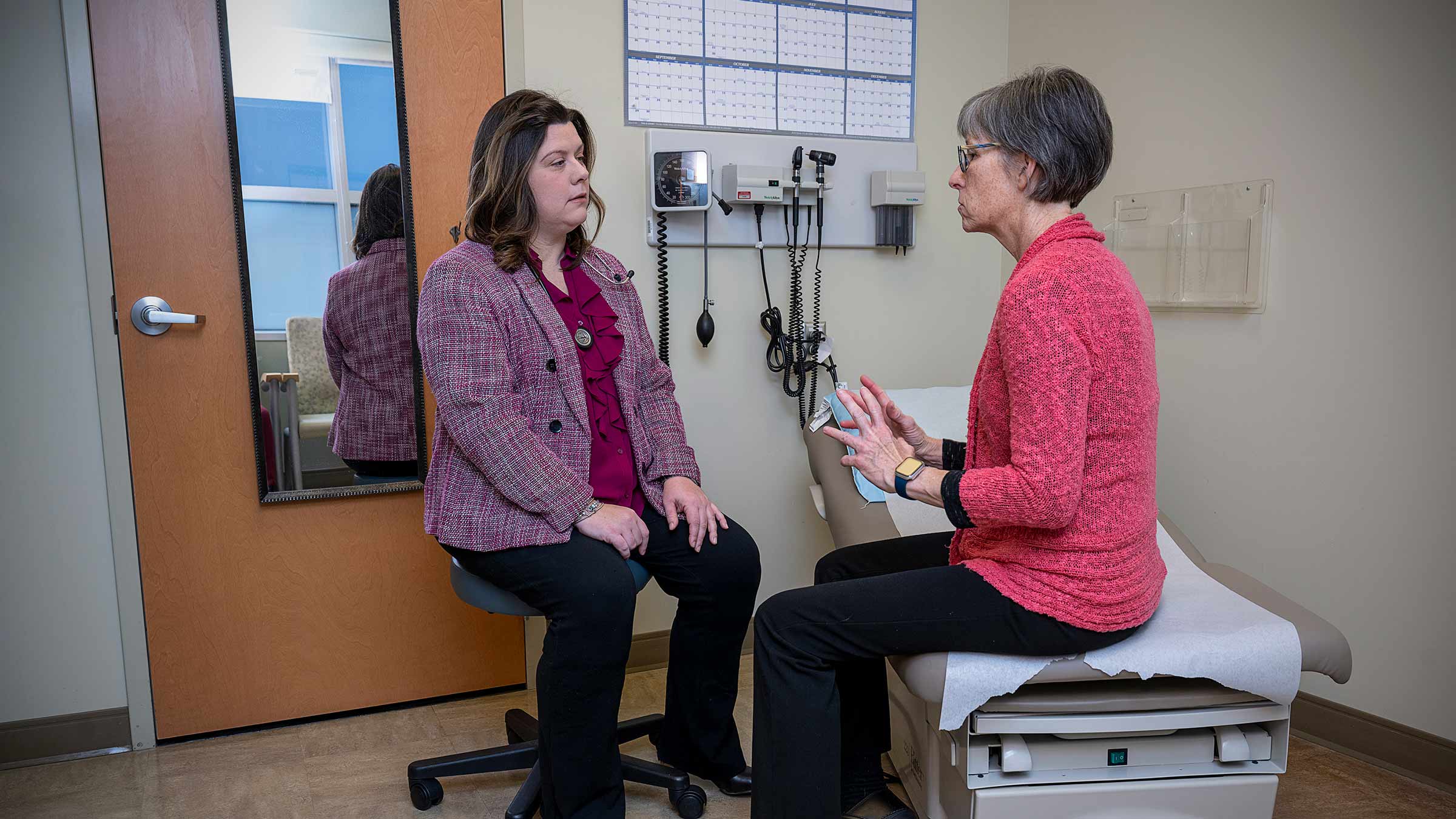Aging well with cancer
Cancer center addresses overall health, quality-of-life issues to help improve cancer outcomes in older adults.
Ted Spellmire can easily pass the time in a doctor’s waiting room with tales from a lifetime of experiences.
He’s been a soldier, a farmer, an elephant whisperer and a college instructor, to name a few.
In his golden years, he’s added another to the list: cancer survivor.
He’s determined it won’t be the last.
“I have every intention of living to be 100,” he says as he sips a coffee. “My mother died at 102. And so, I’m fighting along here.”
First diagnosed with a blood cancer called multiple myeloma in 2018, Spellmire had chemotherapy that knocked the disease down to undetectable levels. Then in early 2023, at age 76, he started to feel unwell again.
The cancer was slowly coming back.
That first round hadn’t left him unscathed. The chemo harmed his heart and caused some nerve damage that left him with pain, mostly in his feet.
For this second go-round, he visited the Cancer and Aging Resiliency Clinic — referred to as the CARE Clinic — a special place that caters to elderly cancer patients of The Ohio State University Comprehensive Cancer Center – Arthur G. James Cancer Hospital and Richard J. Solove Research Institute (OSUCCC – James).
While cancer research and treatment developments have largely been focused on a younger demographic in an effort to increase survival rates, the team at the CARE Clinic ensures that seniors are not overlooked. Here, they get the support and attention they need, not only for their cancer, but also to live the best lives they can.
For Spellmire, that means controlling his cancer, and his pain, as he looks forward to his next adventure this spring — making a return trip to Glacier National Park in Montana, this time with his son and grandsons.

Thriving with age and cancer
One of only a few such clinics in the nation, CARE was started in 2016 by blood cancer expert Ashley Rosko, MD. It offers older cancer patients a one-stop experience to assess, diagnose and address several aspects of overall health.
“I have aging grandparents who are well into their 80s,” says Dr. Rosko, a professor of Internal Medicine at The Ohio State University College of Medicine.
“Watching them thrive and be independent has been an inspiration. I want to maintain that type of health for my patients when they’re diagnosed with cancer.”
The clinic is especially valuable for patients who already have many age-related needs and then receive a cancer diagnosis, Dr. Rosko says.
During their first visit, patients meet with experts in:
- Cancer symptoms
- Medications
- Hearing
- Movement and physical ability
- Nutrition
- Memory and awareness
- Social support services
Along with aspects of physical, mental and emotional health, providers address home-safety concerns, caregiver support issues and other roadblocks to wellness, such as lack of transportation, problems getting food or financial strain.
Expanding care for geriatric oncology
Dr. Rosko recruited lung cancer expert Carolyn Presley, MD, MHS, from the Yale School of Medicine in 2017 to help expand the program. It was a perfect fit for Dr. Presley, who had been torn between specializing in geriatrics (care of aging people) and oncology (care of people with cancer). As a result, she had trained in both.
“I became intrigued by what Ohio State was doing, because not many cancer centers have that level of investment focusing on older adults,” says Dr. Presley, an associate professor of Internal Medicine at the Ohio State College of Medicine.
Dr. Presley, the daughter of a hospice nurse and a physical therapist, has long been passionate about quality-of-life and end-of-life care.
“Older adults are much higher risk. And sometimes their voice isn’t the loudest, or they don’t have a voice or they don’t want to bother anyone,” Dr. Presley says. “So, it’s really about helping the most vulnerable people.”
CARE continued to expand with a breast cancer clinic in 2018 and a pain clinic in 2020. The program now serves patients ages 65 and older with all types of cancers, and offers care in all its clinics to those currently being treated as well as those who have completed treatment.

Tailored care plans
While initial CARE Clinic visits can last as long as two hours, they’re critical in forming treatment plans. For example, a pharmacist can adjust unhelpful medications or those that might interfere with cancer treatments; a dietitian can develop nutrition plans for those at risk of weight loss; and patients at risk of falls can be prescribed physical therapy.
“You have to look at all these factors and really tailor an individualized treatment based on that,” says Nicole Williams, MD, who directs the CARE breast cancer clinic. “We see patients who are, perhaps, very nervous about treatments. Then we’re able to do assessments and intervene, and they tolerate treatment better than they thought they would. And sometimes with physical therapy, they may get stronger than they were before and really thrive.”
With many cancers having several treatment options, care also is tailored around patients’ goals.
“We actually ask patients, ‘What are your goals?’ And then we help them weigh the options, because everything we do has the potential for side effects and decreasing their functional status and quality of life,” Dr. Presley says.
It’s not just about the cancer
Spellmire’s most recent doctor visit was with Erin Stevens, DO, who directs the CARE pain, or “palliative care,” clinic, which focuses on symptom management and extra support.
Spellmire says Dr. Stevens helped him find medication to control his pain. With it, he can sit relatively comfortably, stand for brief periods, walk short distances and get some sleep at night.
Dr. Stevens grew up with a father who fought in World War II, his age closer to that of her friends’ grandparents than their parents. Watching him receive health care informed her career path.
The surgery that saved him from bladder cancer left him with kidney disease. A CARE clinic didn’t exist for him, and 10 years of dialysis made him miserable, with a poor quality of life. Years later, Dr. Stevens’ mother was diagnosed with advanced breast cancer.
“No one ever paused to talk to my father about his goals and what was most important. With my mom, there was always this question of, ‘Does she really understand what’s going on?’” says Dr. Stevens, an associate professor of Internal Medicine at the Ohio State College of Medicine. “The CARE Clinic and the work I do now honors them because it would meet both of their needs.”

Filling unmet cancer and aging research needs
The doctors also strive to broaden the field of research related to cancer in older patients. Current treatments are mostly based on research into otherwise healthy and younger people. This sometimes makes it tricky to modify therapies for older adults with various health problems, and they may be more prone to side effects.
“There’s so much about them that we don’t know: how they’re going to respond to certain treatments, what their side effects are going to be,” says Dr. Williams, an associate professor of Internal Medicine at The Ohio State College of Medicine. “And then, ‘How can we improve treatment in older adults?, How can we lessen side effects?, How can we provide quality care to older adults while also helping them to keep their independence and quality of life?’”
What’s unique about the research done in the CARE Clinic is that results go back into improving the treatment patients receive.
A main example of this is the collection of patient data to help improve cancer outcomes and decrease long-term side effects for those most at risk. The doctors also are reviewing patient blood samples to determine how cancer treatment impacts the aging process.
Other examples of research include:
- Exploring the use of hormone therapy to prepare patients too frail for surgery
- Considering how blood and bone marrow transplants affect the physical and mental health of couples, both the patient and caregiver
- Examining how physical therapy and relaxation exercises improve activity and mood in lung cancer patients
- Working to reduce emergency department visits and hospitalizations by treating pain during lung cancer patients’ regular doctor visits
Support and encouragement for aging cancer patients
Spellmire says the clinic gives patients confidence, encouragement and an assurance that they’re not going downhill as rapidly as they might imagine.
“I’ve got a huge support system. But there are people who have almost no one, or no one at all,” Spellmire says. “For people like that, this clinic is a lifesaver. It’s really, really important.”
He recalls a chat he had with another patient, a man who’d been estranged from his only son and hadn’t seen him in 10 years.
“He told me the only people who give a damn are the people inside this office,” Spellmire says.
“To have that is a wonderful thing.”

Cancer care focused on your goals
The Cancer and Aging Resiliency Clinic addresses overall health and quality of life to help improve cancer outcomes in older adults.
Find out more



